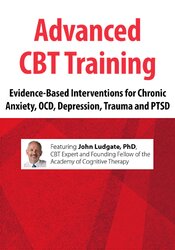
×

Tags: APA
CBT is often considered the “gold standard” of evidence-based treatments and among the most widely accepted approaches to effectively treat chronic, recurring, and challenging mental health issues such as anxiety, OCD, PTSD, depression, and more.
This training will offer you a complete step-by-step guide to easily advance your CBT practice.
You’ll walk away with:
As your trainer and one of the most trusted names in CBT, Dr. Ludgate is the Founding Fellow of the Academy of Cognitive Therapy and trained under Cognitive Therapy’s founder Dr. Aaron Beck at the Center for Cognitive Therapy. Dr. Ludgate is the perfect person to teach you how to get the most out of your CBT, skillfully apply it to a variety of settings and case scenarios, and make it easy to integrate with other approaches you might already be using.
Join hundreds of your colleagues who’ve taken this best-selling training, and register now!
All members of the PESI, Inc. planning committee have provided disclosures of financial relationships with ineligible organizations and any relevant non-financial relationships prior to planning content for this activity. None of the committee members had relevant financial relationships with ineligible companies or other potentially biasing relationships to disclose to learners. For speaker disclosures, please see the faculty biography.
Continuing education credit information is coming soon for this live webcast.

John Ludgate, PhD, is a licensed clinical psychologist who has worked as a psychotherapist for almost 30 years. He trained at the Center for Cognitive Therapy in Philadelphia under Dr. Aaron Beck, the founder of Cognitive Therapy, and is a Founding Fellow of the Academy of Cognitive Therapy. He subsequently became assistant director of training at Dr. Beck’s Center. His current practice consists largely of treating clients referred with mood problems and/or anxiety conditions at the Cognitive-Behavioral Therapy Center of Western North Carolina in Ashville, North Carolina.
John is a native of southern Ireland and obtained a master’s degree in clinical psychology from the University of Edinburgh in Scotland, and a PhD from Trinity College, Dublin, Ireland in 1990. In the early 1990s, Dr. Ludgate was a research clinical psychologist at the University of Oxford in England and served as cognitive therapist in several outcome studies of panic disorder, agoraphobia, social phobia and hypochondriasis.
He authored Cognitive Behavioral Therapy and Relapse Prevention for Depression and Anxiety (Professional Resources Press, 2009) and was co-editor with Wright, Thase and Beck of Cognitive Therapy with Inpatients: Developing a Cognitive Milieu (Guilford Press, 1993). His other books include Overcoming Compassion Fatigue (PESI, 2014 co-authored with Martha Teater) and The CBT Couples Toolbox (PESI, 2018). He has written numerous journal articles and book chapters in the field of Cognitive Behavior for Anxiety and Depression. He has presented many seminars and workshops on cognitive behavioral approaches, both nationally and internationally.
Speaker Disclosures:
For live CE credit, you must watch the live webcast in its entirety at its scheduled time and complete the CE quiz and evaluation within one week. You will have access for 90 days after the program for review.
Please note: Each day there will be a 70-minute lunch and two 15-minute breaks; one in the morning and one in the afternoon. Lunch and break times will be announced by the speaker and at their discretion. A more detailed schedule is available upon request.
Visit our FAQ page at https://www.pesicanada.ca/faq or contact us at https://www.pesicanada.ca/contact-us.
Cognitive Behavioral Therapy: Exploring the Model
Assessment and Treatment Planning Through the Lens of CBT
Behavioral Interventions
Cognitive Interventions
The CBT Session, Step by Step
CBT with Depressive Disorders
CBT with Bipolar and Related Disorders
CBT for Anxiety Disorders
Special Issues
| 5 |
|
| 4 |
|
| 3 |
|
| 2 |
|
| 1 |
|
Satisfaction Guarantee
Your satisfaction is our goal and our guarantee. Concerns should be addressed to info@pesicanada.com.
Please wait ...